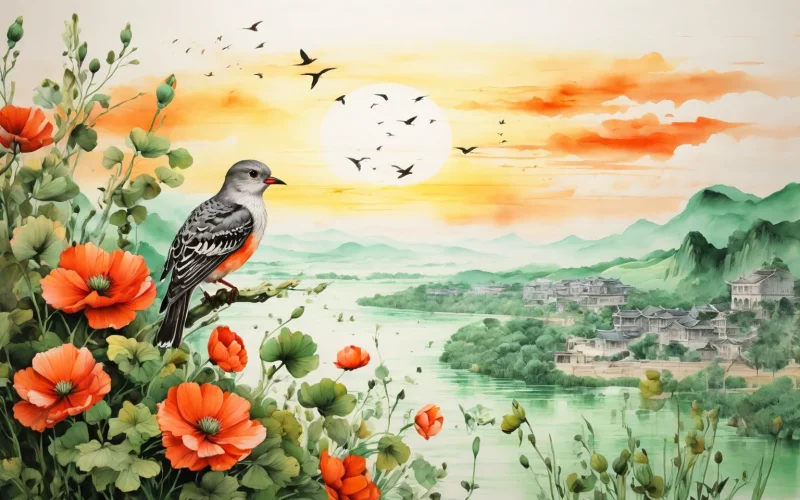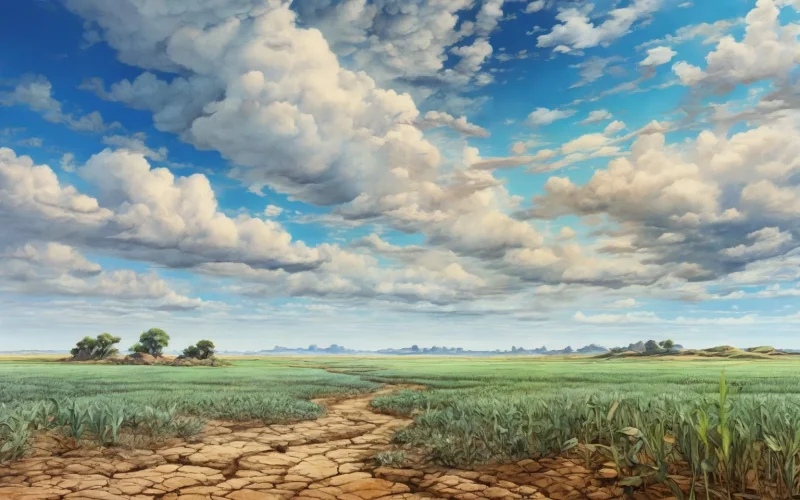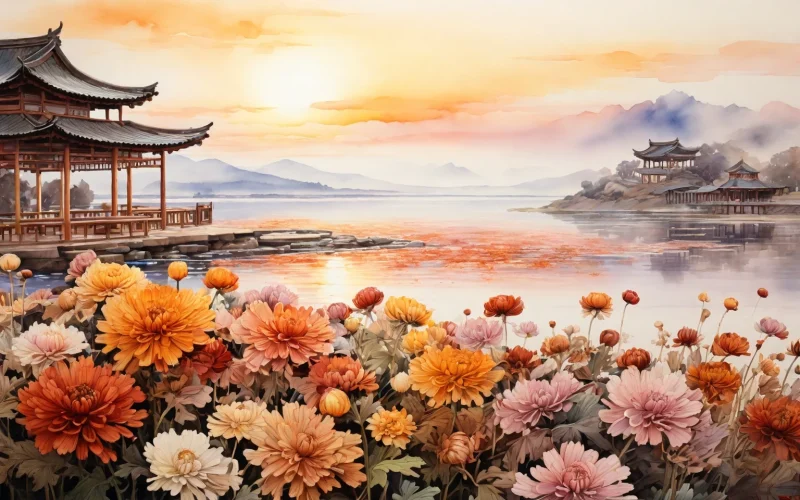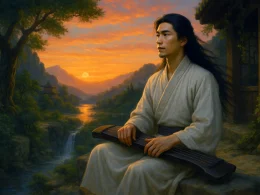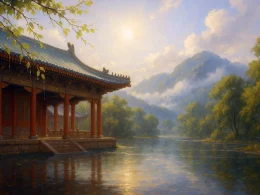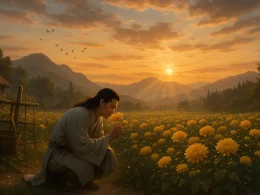You see your splendor gone with the wind disappear;
You waft with resplendent feather from year to year.
Your tears have dyed the flowers red in alien hill;
But when spring comes to your garden, grass looks green still.
Among the leaves, trees dark in rain long you stay;
At moonset you wail and wait for the dawning day.
On Southern River you sadden the setting sun.
Why should you drown in grief the boat of roaming son?
Original Poem
「子规」
吴融
举国繁华委逝川,羽毛飘荡一年年。
他山叫处花成血,旧苑春来草似烟。
雨暗不离浓绿树,月斜长吊欲明天。
湘江日暮声凄切,愁杀行人归去船。
Interpretation
This poem employs the cuckoo bird—a traditional symbol of sorrow in Chinese literature—as a vehicle for Wu Rong's personal grief and profound concern for the nation's decline. Drawing upon the legend of the cuckoo crying blood, the poet constructs a poignant artistic world of displacement, solitude, and melancholic reflection through layered natural imagery and emotional progression.
First Couplet: "举国繁华委逝川,羽毛飘荡一年年。"
Jǔ guó fánhuá wěi shì chuān, yǔmáo piāodàng yī nián nián.
The nation's splendor fades with flowing streams, While drifting feathers haunt my yearly dreams.
The opening juxtaposes the vanished glory of the past ("nation's splendor") with the cuckoo's—and by extension, the poet's—rootless present ("drifting feathers"). The flowing river becomes a metaphor for irretrievable time and lost prosperity.
Second Couplet: "他山叫处花成血,旧苑春来草似烟。"
Tā shān jiào chù huā chéng xuè, jiù yuàn chūn lái cǎo sì yān.
Where alien hills echo its bloody cry, Old gardens smoke with grass—spring passes by.
Here, the cuckoo's legendary blood-tears stain foreign flowers red, while the poet's homeland remains indifferent to spring's arrival. The "smoking grass" suggests both lush growth and misty oblivion, emphasizing the disconnect between personal grief and nature's cyclical renewal.
Third Couplet: "雨暗不离浓绿树,月斜长吊欲明天。"
Yǔ àn bù lí nóng lǜ shù, yuè xié cháng diào yù míng tiān.
Through rain-darkened boughs its wails persist, Till slanting moon pales where dawn's fingers twist.
Time stretches in this couplet as the cuckoo's lament endures from stormy twilight to moonset. The "slanting moon" becomes a celestial mourner, its lingering presence mirroring the poet's unrelenting sorrow that outlasts even the night.
Fourth Couplet: "湘江日暮声凄切,愁杀行人归去船。"
Xiāng jiāng rì mù shēng qī qiè, chóu shā xíng rén guī qù chuán.
At Xiang River's dusk, its plaintive tone Shatters homebound sailors, hearts like stone.
The finale locates the cuckoo's cry at the Xiang River—a classic literary site of exile—where its piercing sorrow overwhelms even returning travelers. The paradoxical "homebound sailors" suggests the poet's own impossible longing for a homeland that no longer exists as he remembers it.
Holistic Appreciation
The poem centers on the cuckoo, weaving its imagery throughout while blending contrast, symbolism, and environmental depiction to intensify emotion layer by layer. Through the cuckoo’s wandering and mournful cries, the poet mirrors his own plight—homeland shattered, career thwarted, and life steeped in solitude. The line "他山叫处花成血,旧苑春来草似烟" juxtaposes crimson and ethereal green, rendering the vicissitudes of human affairs and the impermanence of the world with piercing depth. The closing phrase "Grief slays the wayfarer" elevates personal sorrow into universal resonance, immersing readers in shared melancholy. Elegiac in tone, concise in language, and profound in conception, this work exemplifies the Tang tradition of channeling emotion through objects and voicing ideals through landscapes.
Artistic Merits
The poet ingeniously employs the cuckoo as a symbolic vessel for profound lament. Contrasting images—"distant hills" versus "old gardens," "blood-blossoms" versus "spring grass"—heighten the sense of rootlessness and loss. The poem’s structure deepens progressively, moving through time, space, and psychological layers to amplify its sorrow. Environmental details—dim rain, slanting moon, twilight on the Xiang River—craft a desolate atmosphere that powerfully underscores the poet’s grief for his country and his own forsaken state.
Insights
Through the cuckoo’s mournful wandering, the poem prompts reflection on life’s transience, the world’s mutability, and the absence of belonging. It mourns not only a ravaged homeland but also personal destiny. By bridging object and emotion, the poet reminds us to cherish home and safeguard inner stability, while demonstrating the courage to preserve warmth of feeling amid turmoil. In an era of upheaval, such poetic resilience becomes both witness and solace.
Poem translator
Xu Yuanchong (许渊冲)
About the poet
Wu Rong (吴融, 850 - 903), a late Tang Dynasty poet from Shaoxing, Zhejiang, is known for his poignant reflections on the era's decline. His poetic style bridges the lyrical elegance of Wen Tingyun and the profound melancholy of Li Shangyin, excelling particularly in regulated verse (七律). Blending delicate refinement with somber grandeur, his works alternate between wistful grace and desolate intensity—a voice both tender and trenchant in twilight's hour.






